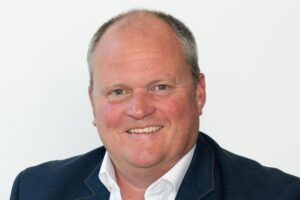
Bob Hair, who leads UK-based wealth manager Cazenove Capital’s activity in Scotland tells Business Matters what defines his way of doing business.
What do you currently do at Cazenove Capital?
I lead Cazenove Capital’s team in Scotland, based in Edinburgh. We have a team of 13 professionals here, all of whom are dedicated to helping entrepreneurs, business owners, professionals and wealthy families to optimise their financial and investment affairs in a fast-paced world.
2022 will mark Cazenove Capital’s thirtieth year in Scotland. The team has grown considerably in recent years, making significant hires and requiring a recent move to new premises in Charlotte Square. The outlook for the region, and the UK as a whole, is strong and we’re looking forward to the challenges that our diverse, dynamic clients will bring in the coming years.
What defines your way of doing business?
Putting it simply, we do the right thing, and seek to do things right. If I had to sum up how we do this in one word, it would be “collaboration”. We pride ourselves on our ability to form deep, lasting relationships and as such we sit on the same side of the table as our clients as they navigate life. Working together to gain a strong understanding of their interests is fundamental not only to meeting their needs, but also ensuring their wealth is preserved, grown and deployed in a way that aligns with their personal objectives and values. Now, more than ever, this is a critical consideration for wealthy clients.
Supporting clients to grow their own networks is another example of collaboration in action. Across each of our regional hubs, Scotland included, we are able to connect clients with local practitioners including accountants, lawyers and other professionals as required. That’s in addition to other clients with similar interests. Providing opportunities for clients to further their business interests organically, through trusted partnerships, is a key differentiator.
In Scotland, our entrepreneurs are also very collaborative and tend to follow a simple mantra – “work hard, play hard and give something back”. By tapping into that willingness to give back, be it with funding, energy or mentorship we also help the next generation of entrepreneurs coming through by curating opportunities for private investment through our extensive network. In so doing, we create a virtuous circle as part of our wider ambition to help Scotland, and the UK as a whole, become the most entrepreneurial society in the world.
What keys to being productive can you share?
Clearly focus on your purpose, and your objectives, understand exactly where you are today and what you need to do to get there. Be prepared to prioritise and say “no” on occasion, and look after yourself and your loved ones.
How do you measure success?
For me, success is multifaceted and measured through a series of day-to-day achievements – the “sum of all parts”.
One day it could be a high-net-worth client engaging their children in the family’s financial affairs with our help and eventually handing over the responsibility for the family’s wealth to the next generation, or facilitating them making a significant philanthropic donation to a cause close to their hearts. Or even something as fundamental as counselling a business owner and knowing you have helped them securely exit their business to secure their financial independence. It can be simply bringing clarity and simplicity to a confusing situation where financial arrangements have been accumulated over many years, building a team of multi-disciplined advisers to safeguard the interests of a family, or helping to guide the path in difficult circumstances such as the death of a family member, or divorce. We play a fundamental role in each process, working closely with the client for many months and years to achieve their desired outcome.
Clearly, every client has distinct goals, financial and non-financial. I feel a sense of success and pride if we exceed their expectations in defining and meeting these goals. Doing that without fuss, time after time over decades, could be defined as success.
What’s the most valuable lesson you’ve learned during your career?
Always do the right thing no matter how difficult it seems at the time – and that kindness is not a weakness in business.
What are your favourite things to do outside of work? How do you maintain a solid work/life balance?
My life outside of work revolves around my family, who keep my feet on the ground and work/life balance in check. When I can I like to ski, golf, catch up with friends and watch sport.
In your view, how has entrepreneurialism in the UK changed over the years?
Historically, entrepreneurs have been the catalysts behind some of the UK’s most significant industrial periods. Different regions have a long-term association with particular industries, for example textile markets in Yorkshire, iron and steel in Sheffield and shipbuilding in Glasgow. The word “industry” now represents a much broader and more diverse array of activities, but we see similar trends playing out today as we did over 100 years ago.
The UK’s modern industrial activity is concentrated into similar clusters. The South-East enjoys a close association with fintech activity, earning the region the nickname “the Silicon Roundabout” although Scotland is also no slouch in this area. Scottish industry is increasingly linked to technology in all its forms, particularly health-tech, and also sustainability, which was put under a global spotlight with last year’s COP26 Conference in Glasgow. In Manchester, the growth of fast-paced digital and media companies now means much of the UK’s television is produced and distributed from the city.
Entrepreneurialism in 2022 is less about status than it was in the past. Generally, entrepreneurs are individuals who identify a way to make money from their passions. And more and more we are seeing virtuous circles developing where today’s entrepreneurs support the next generation coming through.
What sets Scotland’s entrepreneurs apart?
The UK’s entrepreneurs are up there with some of the best globally, but Scotland has a few unique characteristics. The depth of the country’s entrepreneurial community means we are front and centre in the development of technological advancements in almost every field imaginable. Our workers are committed and hard-working; this has undoubtedly contributed to the strength of entrepreneurial spirit in Scotland.
The ambition of our people collectively also means that the Scottish diaspora is truly global in nature, so our innovators and entrepreneurs have been doing their work for hundreds of years in every corner of the globe. Understanding how to leverage that global but disparate potential is a challenge which technology helps surmount by giving better connectivity and communication than ever before. Having given the world so much, we need to reverse the trend to export our best people and ideas, and now find ways for inward investment of capital, entrepreneurs and technology.
Scotland at first observation has a fantastic eco-system for entrepreneurs, with a supportive government and public bodies, leading universities, supportive venture and angel investment framework and a rich heritage for entrepreneurialism. Yet we lag behind other areas in the UK in many metrics – the most significant being funding. We ask for less and secure less as a rule. We need to be as good at scaling businesses as we are at generating ideas and starting them.
How are you (and the business) positioning yourself to meet entrepreneurs’ needs in the future?
We are not just supportive of the eco-system for entrepreneurs in Scotland; we are a big part of it. We sponsor events, provide facilities for, support, connect with, advise and curate opportunities for entrepreneurs, investors, angel syndicates, venture capitalists, universities, incubators, accelerators and sector-specific support networks across Scotland. This gives us a deep knowledge of what is going on, who is doing what but most importantly the issues faced by entrepreneurs and investors alike.
Having looked after multiple generations of entrepreneurs, their families and their foundations we have also been privileged to serve the sector through thick and thin. It’s a bit like being a guide on a mountain – we know all of the paths, not just those well travelled! So that implicit knowledge and active support for the sector helps us provide support at every step of the journey they are on – often using our experience to provide guidance on aspects they haven’t even considered yet.
And when they have secured financial independence from their own endeavours, we take care of the wealth they have created, typically becoming custodians to preserve and grow what they have worked so hard to create, managing risk and tax as we go.
Our clients’ wealth is their future. Understanding the trends shaping future economic activity, and creating strategies in alignment with those influences, is a fundamental part of our service. Ultimately, we want our clients to continue growing their wealth to meet their future goals, so being able to take advantage of broader trends is very important.
Being able to draw on the expertise of our parent company, Schroders Group, also underpins how we pivot to broader trends, and meet clients’ demand for exposure to certain asset classes. In recent years, we have significantly developed our sustainable investment franchise. Alternatives has also become a key asset class, given its resilience in the face of broader headwinds.
Factoring in the regional presence of our client base is also key. The proportion of the UK’s wealth that is generated outside of London cannot be ignored; it is important to us to have on-the-ground presence across different regions to meet local clients’ needs and optimise the service they receive. We are committed to identifying opportunities to grow our regional presence, as we have done in recent years with new spaces in Birmingham, Manchester and Bristol.
Read more:
Getting To Know You: Bob Hair, Scottish lead, Cazenove Capital





